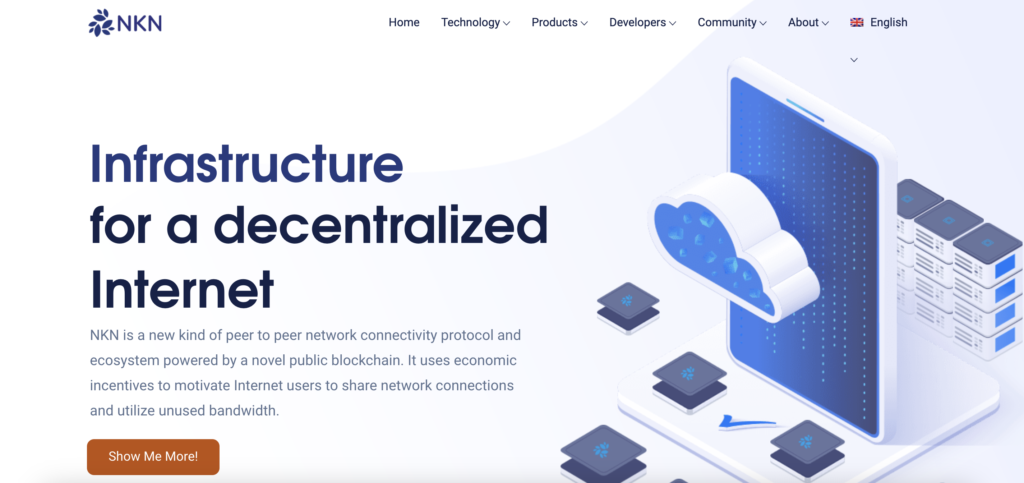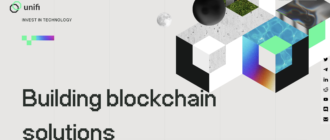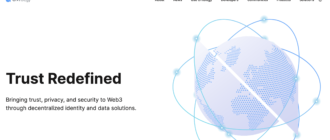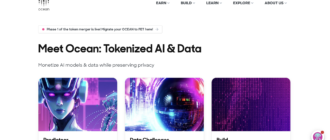In this article, we will delve into the New Kind of Network (NKN) project and its native cryptocurrency, NKN. We aim to provide a comprehensive overview of what NKN is, examining its technological framework, tokenomics, ecosystem, and growth prospects. NKN represents a pioneering approach to decentralizing internet infrastructure by leveraging blockchain technology to create a more secure, open, and efficient network. As we explore this innovative project, we will highlight its unique features, underlying mechanisms, and potential for future development.

What is NKN?
New Kind of Network (NKN) is an open-source protocol designed to revolutionize peer-to-peer (P2P) network connectivity by decentralizing network resources. NKN leverages blockchain technology to create a public blockchain that tokenizes network connectivity and data transmission capacity. The project’s main objective is to address the centralization, scalability issues, and security concerns prevalent in today’s internet infrastructure. By decentralizing network resources, NKN aims to create a more secure, open, and efficient network that allows for direct peer-to-peer communication without relying on centralized servers.
NKN achieves this through its innovative Proof of Relay (PoR) consensus mechanism, which rewards participants for relaying data and providing network connectivity rather than consuming computational power, as seen in traditional Proof of Work (PoW) systems. This mechanism incentivizes users to share their network bandwidth and contribute to the network’s overall connectivity and data transmission capabilities.
Key features of the NKN network include:
- nConnect: A secure remote access protocol enabling users to access private data and files without the need for public IP addresses or exposed ports.
- nMobile: A decentralized mobile application offering secure chat and wallet integration for non-custodial token storage.
- dataRide: A platform providing resources and documentation for the development of decentralized applications (dApps).
- Global ID: A unique addressing system that simplifies access to the NKN ecosystem and its services.
These features collectively support the development and deployment of decentralized applications, enhancing the network’s utility and user experience.
History of the Project
NKN was founded in January 2018 with the vision of creating a decentralized, community-owned network infrastructure. The project quickly garnered attention and secured funding through an Initial Coin Offering (ICO) in April 2018, raising over $12 million in minutes. The successful ICO facilitated the rapid development and launch of NKN’s mainnet in July 2019.
Significant milestones in NKN’s history include:
- 2018: The project was founded and completed a successful ICO. The main focus during this period was on developing the core protocols and securing partnerships.
- 2019: Launch of the NKN mainnet, introducing the innovative Proof of Relay consensus mechanism and establishing a decentralized data transmission network.
- 2020: Expansion of the NKN network with strategic partnerships, including collaborations with China Mobile and iQiyi, a Baidu-owned video streaming service.
- 2021: NKN achieved significant network growth, reaching over 123,000 nodes across 62 countries. The launch of the nConnect protocol facilitated secure remote access solutions, particularly useful during the COVID-19 pandemic.
- 2022 and Beyond: Continued development of the NKN ecosystem with an increasing number of applications and integrations. The project aims to further enhance its network infrastructure and broaden its adoption in various industries.
Throughout its development, NKN has focused on creating a robust, scalable, and secure network that leverages unused bandwidth, incentivizes participation, and promotes a decentralized internet. The project’s ongoing advancements and strategic partnerships underscore its potential to reshape the digital landscape.
How NKN Works
NKN (New Kind of Network) is built on innovative technologies designed to decentralize and optimize network connectivity. The project leverages several key technological components to achieve its goals, differentiating itself from other blockchain and network infrastructure projects.
Cellular Automata
At the core of NKN’s technology is the use of Cellular Automata (CA). CA is a discrete model consisting of a grid of cells, each of which can be in one of a finite number of states. The state of each cell evolves over time based on a set of rules that consider the states of neighboring cells. This allows NKN to create a dynamic and self-organizing network topology where nodes (individual network participants) interact locally but contribute to the global network state. This approach ensures efficient data transmission and a robust, decentralized network infrastructure.
Decentralized Data Transmission Network (DDTN)
NKN introduces the concept of the Decentralized Data Transmission Network (DDTN). This network consists of numerous independent and self-organized relay nodes that provide connectivity and data transmission capabilities without relying on centralized servers. DDTN enhances the network’s scalability and resilience by enabling multiple efficient paths between nodes, thus optimizing data flow and reducing bottlenecks.
Proof of Relay (PoR) Consensus Mechanism
NKN employs a unique consensus mechanism known as Proof of Relay (PoR). Unlike traditional Proof of Work (PoW) mechanisms that consume significant computational resources, PoR rewards nodes for relaying data across the network. This makes the consensus process energy-efficient and directly tied to the network’s primary function: data transmission.
PoR works by creating a verifiable and untamperable proof that a node has relayed a specific amount of data. This is implemented through a signature chain, where each relay node signs a hash of the data packet and its own NKN address. This chain ensures that the data transmission can be independently verified without being forged or altered, thus maintaining the integrity and security of the network.
Cellular Automata-Based Consensus
The consensus mechanism in NKN also incorporates Majority Voting Cellular Automata (MVCA) algorithms. MVCA enables highly scalable consensus by allowing nodes to reach agreement through local interactions rather than global voting, as seen in Byzantine Fault Tolerance (BFT) systems. This method significantly reduces the time and communication overhead required to achieve consensus, supporting a network that can scale to millions or even billions of nodes.
Network Topology and Routing
NKN’s network topology is dynamically evolving, driven by local interactions and the CA model. This dynamic topology ensures that the network remains decentralized and resilient, as it prevents the formation of central hubs that could become points of failure. The routing of data packets is managed through a Chord Distributed Hash Table (DHT), which maps each NKN address to a position on the Chord ring, facilitating efficient and direct peer-to-peer communication.
Technical Innovations and Differentiation
NKN stands out from other projects through its integration of Cellular Automata for network topology, the innovative PoR consensus mechanism, and the focus on decentralized data transmission. These technologies collectively enable NKN to create a self-evolving, energy-efficient, and highly scalable network infrastructure. By incentivizing nodes to contribute connectivity and bandwidth, NKN ensures a robust and efficient network that can adapt and grow organically.
In summary, NKN combines advanced computational models with blockchain technology to build a decentralized and efficient network infrastructure. Its unique approach to consensus and network topology sets it apart from other projects, positioning it as a leader in the quest to decentralize the internet and optimize data transmission.
Tokenomics of NKN
NKN (New Kind of Network) operates with its native token, NKN, which is an essential component of its decentralized network infrastructure. The NKN token functions as both a utility and a reward mechanism within the ecosystem, facilitating data transmission and incentivizing network participation.
Token or Coin?
NKN is classified as a token rather than a coin. It operates on the NKN blockchain and plays a pivotal role in the network’s operations, primarily serving to incentivize and reward participants for sharing network bandwidth and connectivity resources.
Key Characteristics and Utility
- Network Resource Contribution: NKN tokens incentivize users to contribute their bandwidth and connectivity to the network. Participants, known as nodes, earn NKN tokens for relaying data and maintaining network integrity.
- Data Transmission: The tokens are used to pay for data transmission services within the NKN network, ensuring secure and efficient data exchange across the decentralized network.
- Transaction Fees: NKN tokens cover transaction fees for various operations on the blockchain, including smart contracts and other transactional activities.
- Incentives and Rewards: Nodes and data providers receive NKN tokens as rewards for their participation, encouraging continuous contribution and network expansion.
- Decentralized Applications (dApps): Developers can integrate NKN tokens into their applications for functionalities such as user rewards and premium features, fostering a dynamic ecosystem of decentralized applications.
- Community Governance: Holding NKN tokens may grant users governance rights, enabling them to participate in decision-making processes, protocol updates, and other critical aspects of the project.
Emission Model and Supply
NKN has a maximum supply of 1 billion tokens, with approximately 755 million tokens currently in circulation. The tokens were distributed through an Initial Coin Offering (ICO) in April 2018, where 10% of the total supply was sold, raising $12.6 million. The tokenomics were designed to support the network’s growth and ensure a fair distribution of rewards.
Price and Market Performance
As of early 2024, the NKN token’s market price has seen significant fluctuations. Its all-time low was recorded at $0.006411 in March 2020, and it has since experienced substantial growth. The token’s price reached an all-time high of approximately $1.48 in April 2021. Currently, NKN is traded on major cryptocurrency exchanges such as Binance, Coinbase, and KuCoin, with a market cap of around $70 million.
Unique Aspects and Differentiation
NKN differentiates itself through its unique Proof of Relay (PoR) consensus mechanism, which rewards nodes for the actual data they relay, making the mining process energy-efficient and directly tied to the network’s utility. This approach contrasts with traditional Proof of Work (PoW) mechanisms that rely on computational power.
The network’s reliance on Cellular Automata (CA) for dynamic and decentralized network topology further distinguishes it. This innovative approach allows the network to self-organize and adapt efficiently, maintaining robustness and scalability.
Where to Buy NKN
NKN tokens are available for purchase on several major cryptocurrency exchanges. Below is a list of platforms where you can trade NKN:
- Binance: One of the largest and most popular cryptocurrency exchanges globally, offering a wide range of trading pairs for NKN, including NKN/USDT and NKN/BTC.
- HTX (Huobi): Another prominent exchange with extensive features for buying and selling NKN. Trading pairs often include NKN/USDT.
- MEXC: A well-known exchange that provides access to NKN tokens with various trading pairs.
- Gate.io: Primarily known for its derivatives trading, Gate.io also supports spot trading for NKN, typically paired with USDT.
- KuCoin: This exchange offers a user-friendly platform for trading NKN, with pairs like NKN/USDT and NKN/BTC.
Step-by-Step Guide to Buying NKN
- Register an Account: Sign up on your chosen exchange (e.g., Binance, Huobi).
- Verify Your Identity: Complete the necessary KYC (Know Your Customer) processes to verify your identity.
- Deposit Funds: Deposit fiat currency or another cryptocurrency to your exchange wallet.
- Buy NKN: Navigate to the trading section, search for NKN, and place a buy order for the desired amount.
Where to Store NKN
Once you have purchased NKN tokens, it is essential to store them securely. Here are some recommended wallets and their storage capabilities:
Software Wallets
- Trust Wallet: A mobile wallet that supports NKN and provides a user-friendly interface, secure storage, and integrated exchange features.
- MetaMask: A browser extension wallet that supports NKN tokens, allowing easy access to your holdings through any compatible web browser.
Hardware Wallets
- Ledger Nano S/X: These hardware wallets offer offline storage for NKN, providing high security against online threats. The Ledger Live app facilitates easy management of your tokens.
- Trezor: Another reliable hardware wallet, Trezor supports NKN through its integration with compatible interfaces, offering robust security features.
Web Wallets
- MyEtherWallet (MEW): A popular web wallet that supports NKN tokens, providing convenient access through a web interface while ensuring your private keys remain secure.
Wallet Capabilities
- Security: Hardware wallets like Ledger and Trezor provide the highest level of security by keeping your private keys offline.
- Convenience: Software wallets such as Trust Wallet and MetaMask offer easy access to your tokens, suitable for frequent transactions and management.
- Compatibility: Ensure the wallet you choose supports NKN tokens and provides seamless integration with other blockchain services you may use.
By carefully selecting where to buy and store your NKN tokens, you can ensure both the security and accessibility of your cryptocurrency assets.
Project Prospects
Growth Drivers
The growth of the NKN project is underpinned by several key factors:
- Innovative Technology: NKN leverages Cellular Automata and its unique Proof of Relay (PoR) consensus mechanism to create a decentralized and efficient network infrastructure. This technological foundation ensures scalability, security, and energy efficiency, distinguishing NKN from traditional blockchain projects.
- Expanding Ecosystem: NKN’s ecosystem includes a variety of applications and services such as nMobile, nConnect, and dataRide. These applications enhance user privacy, secure data transmission, and decentralized application development, attracting a broad range of users and developers.
- Strategic Partnerships: NKN has formed strategic partnerships with major tech companies such as China Mobile, Synology, QNAP, and ASUS. These collaborations enhance the project’s credibility and expand its reach into various markets, including telecommunications and network-attached storage solutions.
- Community and Developer Support: A strong open-source development community contributes to continuous improvements and innovations within the NKN ecosystem. The availability of developer tools and resources encourages wider participation and fosters an environment of collaborative growth.
Clients and Partners
NKN’s clients and partners span various industries, emphasizing its versatile applications:
- China Mobile: For telecommunications and edge computing solutions.
- iQiyi: A Baidu-owned video streaming service leveraging NKN for content delivery.
- Synology, QNAP, ASUS: Collaborations for launching nConnect globally, enabling secure remote work and data access.
Future Projections
The future of NKN looks promising with several advancements on the horizon:
- Network Expansion: With over 180,000 consensus nodes operating globally, NKN aims to further expand its network, improving robustness and data transmission capabilities.
- Enhanced Features: Continuous upgrades to the NKN mainnet and applications like nMobile and nConnect will provide improved security, user experience, and functionality.
- Increased Adoption: As decentralized technologies gain traction, NKN is well-positioned to capture a significant share of the market, especially in sectors requiring secure and efficient data transmission.
Ecosystem
NKN’s ecosystem is robust and growing, offering various tools and applications:
- nMobile: A decentralized messaging app with integrated crypto wallet functionality, ensuring secure and private communication.
- nConnect: Provides secure remote access to personal and business data across different devices, emphasizing high security and privacy.
- dataRide: Facilitates the creation of decentralized applications with resources and technical documentation, making it easier for developers to build on the NKN network.
- Global ID: A unique identifier system that enhances user interaction with the NKN ecosystem by simplifying access to decentralized applications and services.
These components collectively enhance the utility and appeal of the NKN network, driving its adoption and integration into various technological and business processes.
Conclusion
NKN stands at the forefront of efforts to decentralize and enhance internet connectivity through blockchain technology. By transforming how data is transmitted and managed across networks, NKN offers a promising alternative to traditional centralized models. Its innovative Proof of Relay consensus mechanism, extensive ecosystem of applications, and commitment to security and efficiency underscore its potential impact. As NKN continues to evolve, it holds significant promise for reshaping the digital landscape and driving the adoption of decentralized solutions in various sectors.






